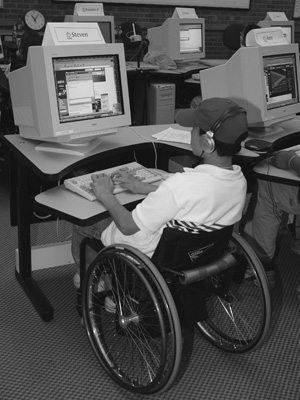Introduction

A series of activities were undertaken to understand the underrepresentation and increase the participation of people with disabilities in science, technology, engineering, and mathematics (STEM) careers. These activities were funded by the Research in Disabilities Education (RDE) program of the National Science Foundation (NSF). They were coordinated by the Northwest Alliance for Access to Science, Technology, Engineering, and Mathematics (AccessSTEM), which is directed by Sheryl Burgstahler.
Capacity Building Activities
AccessSTEM collaborated with three other Regional Alliances for Persons with Disabilities (RADs) to:
- conduct a Capacity-Building Institute (CBI)
- share results of the CBI with NSF projects and other stakeholders
- provide an electronic forum to continue discussion of accessibility issues and provide support for accessibility efforts
- extend resources to other programs and promising practices via an online searchable Knowledge Base
AccessSTEM is a project of DO-IT (Disabilities, Opportunities, Internetworking, and Technology) at the University of Washington in Seattle. AccessSTEM serves to broaden participation in STEM fields through the inclusion of individuals with disabilities.
Goal and Outcomes
All of these activities support an NSF goal: "Working to broaden participation in science and engineering reinforces NSF's mandate to fund the best ideas from the most capable researchers and educators, now and in the future" (Investing in America's Future: Strategic Plan FY 2006-2011, NSF, www.nsf.gov/publications/pub_summ.jsp?ods_key=nsf0648, p. 3). AccessSTEM Capacity Building outcomes benefit society by making STEM opportunities available to more citizens and enhancing STEM fields with the perspectives of people with disabilities.
Audiences for These Materials
This booklet was created for people who:
- participated in the AccessSTEM Capacity-Building Institute
- want to conduct their own Capacity-Building Institute at their institution, in their region, or in a nationwide or international forum
- seek to increase their understanding of issues surrounding the underrepresentation and participation of individuals with disabilities in STEM studies and careers
- are motivated to join an electronic community to continue discussion of these issues
- are NSF project directors and program officers interested in increasing the participation of people with disabilities in all NSF projects
- would like to get connected to resources to help them make their project resources and activities accessible to people with disabilities
- have promising practices to share with others